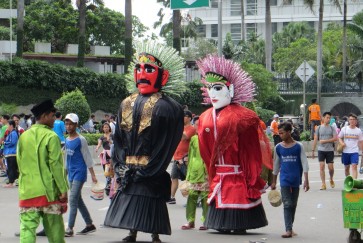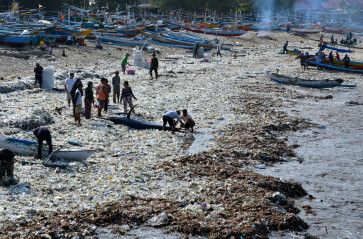Paul Wolfowitz waxes nostalgic about Indonesia
Old buddies: Paul Wolfowitz (right), a former deputy US Secretary of State and ambassador to Indonesia, chats with Jusuf Wanandi, The Jakarta Post publisher PT Media Tenggara president director at a public lecture on US-Indonesia relations in Jakarta on Tuesday
Change text size
Gift Premium Articles
to Anyone
 Old buddies: Paul Wolfowitz (right), a former deputy US Secretary of State and ambassador to Indonesia, chats with Jusuf Wanandi, The Jakarta Post publisher PT Media Tenggara president director at a public lecture on US-Indonesia relations in Jakarta on Tuesday. (JP/Jerry Adiguna) (right), a former deputy US Secretary of State and ambassador to Indonesia, chats with Jusuf Wanandi, The Jakarta Post publisher PT Media Tenggara president director at a public lecture on US-Indonesia relations in Jakarta on Tuesday. (JP/Jerry Adiguna)
Old buddies: Paul Wolfowitz (right), a former deputy US Secretary of State and ambassador to Indonesia, chats with Jusuf Wanandi, The Jakarta Post publisher PT Media Tenggara president director at a public lecture on US-Indonesia relations in Jakarta on Tuesday. (JP/Jerry Adiguna) (right), a former deputy US Secretary of State and ambassador to Indonesia, chats with Jusuf Wanandi, The Jakarta Post publisher PT Media Tenggara president director at a public lecture on US-Indonesia relations in Jakarta on Tuesday. (JP/Jerry Adiguna)
O
span class="caption" style="width: 510px;">Old buddies: Paul Wolfowitz (right), a former deputy US Secretary of State and ambassador to Indonesia, chats with Jusuf Wanandi, The Jakarta Post publisher PT Media Tenggara president director at a public lecture on US-Indonesia relations in Jakarta on Tuesday. (JP/Jerry Adiguna)
Paul Wolfowitz enjoyed immense popularity when he served as US ambassador to Indonesia from 1986 to 1989. In his farewell speech, he shocked then president Soeharto by talking about the need for more 'openness' in Indonesia.
Local sentiment toward this 'true friend of Indonesia' turned acrimonious, however, when while deputy secretary of defense in the George W. Bush administration he took hawkish positions and helped engineer the war in Iraq.
Grasping that legacy, Wolfowitz clearly tried to avoid 'sensitive' issues during a public lecture titled 'US-Indonesia Relations in a Changing East Asia' hosted by The Jakarta Post at Hotel Mulia on Tuesday. Instead, he reminisced about experiences he had as an American envoy and praised Indonesia for its ability to dramatically transform itself into the world's third largest democracy after India and the US.
'I indicated in my farewell remarks in 1989 that greater openness is key to Indonesian economic and political success. Look where Indonesia is at now,' the former World Bank president said.
The 69-year-old Wolfowitz recalled how he learned to speak Indonesian from his driver and discussed his close relationship with former president Abdurrahman 'Gus Dur' Wahid, who he remembered fondly for his critical mind and 'signature laugh'.
'What Gus Dur achieved in his presidency is how he made Indonesia, a Muslim-majority population, a model country for religious tolerance,' said Wolfowitz.
'If there's any recommendation I can give to the Indonesian government today it's that they should end impunity of the religion-intolerant minority,' he added.
It was only after being questioned on the Iraq War by Post editor in chief Meidyatama Suryodiningrat that Wolfowitz discussed the controversial position he took in the Bush administration.
Wolfowitz defended his old assertions, repeating again how dangerous Saddam Hussein was and how things would be different today if the dictator was still in power. Many of those in the audience shook their heads in
disagreement.
But he also acknowledged that if things could be different, there should have been no occupational government after Hussein was toppled, but rather Iraqi leadership.
'Looking at the relative success of the counterinsurgency strategy implemented only in 2007, insurgency should have been anticipated earlier in the post-war planning,' he said. (asw)









